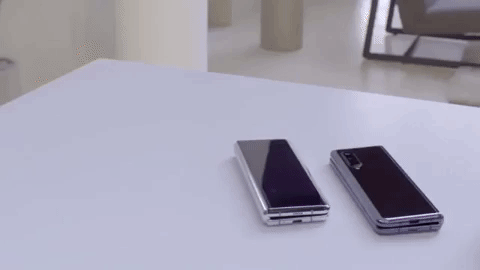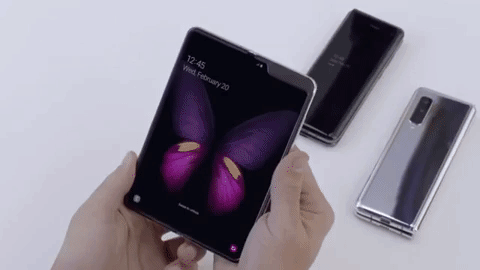Behold the Samsung Galaxy Fold under glass
Samsung decided to forgo the Mobile World Congress pomp and circumstance, instead opting to unveil its new products through its own party last week in San Francisco. I’ve been carrying around a Galaxy S10 for a few days now, so more on that soon. In the meantime, here’s the device everyone is really interested in.
As promised, the Galaxy Fold was on display at the company’s booth this morning, but it was protected by security rope and thick panes of glass, like so many carbonited Han Solos. Not folding and unfolding — just static, playing videos while throngs of reporters elbowed one another, jockeying for a bit of space.

It’s not a production device just yet. And honestly, it’s not the kind of display that engenders a lot of faith that the product will be coming to market in just under two months. At least it’s a step ahead of where we saw it late last year.
In the meantime, there’s this new video from Samsung. It’s a highly controlled “demo,” devoid of soundtrack (with some ASMRy sound effects). It shows more of the Fold than we’ve seen so far — which, granted, isn’t a particularly high bar, as far as these things go. You can, however, see folding and unfolding, and the same Wireless PowerShare feature you’ll find on the S10 and DeX functionality for bringing contact to an even larger screen via USB-C.

You can also catch glimpses of the App Continuity feature, which picks up your workflow where you left off, even as you switch between screens. But again, how that sort of thing plays out in person versus a video shot and edited by Samsung is a different question altogether. The positioning of the product at MWC leaves one wondering whether the company has worked through all of the software kinks.
At least we can see that the hardware exists in the world. We know there are four of these things in the world, each of which was on display behind glass (two with the screen facing out and two with the rear). We also know that, like Huawei’s device, the fold crease is highly visible when the light catches it. How much of an impact that will ultimately have on, say, the movie-viewing experience is another one of those open questions.
But Samsung is a big company with a lot of resources, and it’s got roughly two months to make sure everything is in working order on the device. Given the $1,899 starting price, it no doubt wants to get everything right. The clock is ticking.
Powered by WPeMatico
